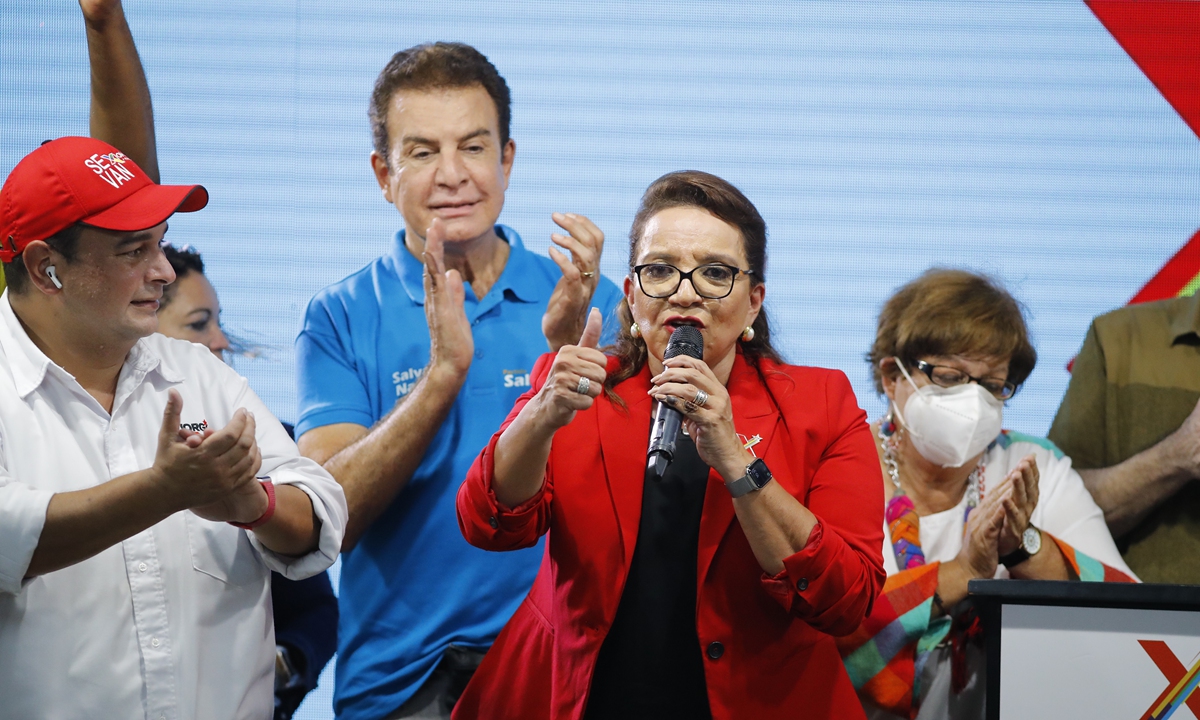
Presidential candidate Xiomara Castro (Red) speaks after hearing the partial results of the elections, in Tegucigaloa, Honduras, 28 November 2021. Photo: thepaper.cn
The election of Xiomara Castro as Honduras's first woman president ( and the only one in today's Latin America) made worldwide news. Election results in Central American countries rarely do that, but there is a good reason for it. Her victory represents a break with the tragic last 12 years of misrule and mismanagement which have driven the country into the ground, most recently under the presidency of Juan Orlando Hernández.
Honduras is one of the poorest countries in the Americas (48 percent of the population lives under the poverty line, a figure that reaches 60 percent in rural areas, according to the World Bank). It is known mostly for the tens of thousands of people who flee the country's violence, crime and endemic poverty, and attempt to make it across the US-Mexican border. Its high murder rate (41 per 100,000 in 2019, with the city of San Pedro Sula, the second largest, known as the murder capital of the world) and the large number of journalists who are routinely killed (42 since 2010, according to UNESCO), would lead one to think that the living hell that the country has become for its citizens would be a major news story. Yet, it hasn't been one. The Honduran descent into a narco-state has received little attention, not just from the media, but also from those responsible for regional law enforcement.
Moreover, the media reported that there is generalized consensus that Hernández stole the November 26 2017 presidential election. The vote count was suspended in the middle of the night, when Hernández was running behind, and when the polls opened in the morning, he miraculously emerged as a winner.
Hernández was thus free to continue to build up Honduras as the first narco-state of the Americas. In 2018, the president's brother, Juan Antonio ( "Tony") Hernández, a former member of the Honduran Parliament, was arrested in the United States for his association with the Cartel de Sinaloa, the Mexican drug cartel. The drug lords valued his services so much that they named a particular strain of cocaine after him, stamping the bags as "TH". Tony Hernández was convicted of four charges in 2019, sentenced to 30 years in prison and has been in US federal prison since. President Hernández denies any association with the cartel, but the evidence points to the contrary. As reported in The Economist, in a trial held in New York City, one accused drug trafficker alleged that President Hernández took bribes for "helping cocaine reach the United States". Another witness testified that the president had taken two bribes in 2013, before being elected; a former cartel leader testified that the president had been paid $250,000 to protect him from being arrested.
Such are the depths from which president-elect Xiomara Castro will have to rescue the country that gave its name to the term "banana republic". She will have her work cut out for her. Stamping out corruption and drug trafficking should, of course, be a first priority. But she will also have to give a fresh impetus to the nation's development, which has lagged far behind that of its neighbors on the Central American isthmus. As a candidate, Mrs. Castro promised that she would establish diplomatic relations with the People's Republic of China. Not having these links has shown to be a handicap during the COVID-19 pandemic, making it difficult for Honduras to access Chinese vaccines. Few would question the fact that China would offer great opportunities to Honduras in trade, investment and project financing. Honduras' infrastructure is especially deficient, an area in which the BRI and the AIIB could make a huge difference.
Since 2017, Panama, El Salvador and the Dominican Republic have established diplomatic relations with China. For a time, Panama was especially active in making the most of what these links offer. Honduras will be under strong pressure not to open links with Beijing. If Mrs. Castro, who describes herself as a democratic socialist, really wants to make a clean break with her country's recent past, she should follow her own counsel, and put her country's interest first. This would mean following a policy known as Active Non Alignment, which refuses to take sides, establish diplomatic relations with all countries around the world, and make the most of the many opportunities they offer. The long-suffering people of Honduras deserve no less.
The author is research professor at the Pardee School of Global Studies, Boston University, a Wilson Center global fellow in Washington D.C. and a non-resident senior research fellow at the Center for China and Globalization (CCG) in Beijing. opinion@globaltimes.com.cn




